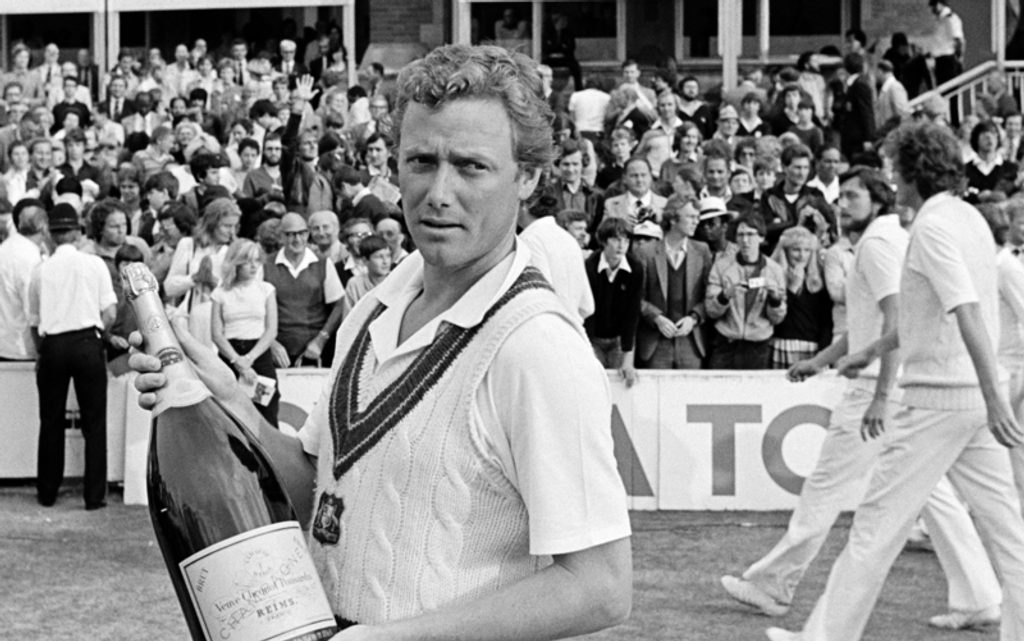
Christian Ryan’s Golden Boy: Kim Hughes and the bad old days of Australian cricket has been adjudged by our esteemed panel to be the finest cricket book ever written. Ryan talked to Jon Hotten, Wisden Cricket Monthly‘s reviews editor, about the process of writing his acclaimed book on the former Australia captain.
This interview is from issue 19 of Wisden Cricket Monthly. Pick up a copy here.
Previously in the WCM series supported by Rathbones:
How do you judge the greatest cricket book ever written?
The final shortlist: Read the debate on the best cricket books ever
WCM’s best cricket book ever – revealed
Many congratulations, Christian. Perhaps we can start by asking why you wanted to write about Kim Hughes and his era?
I didn’t know if I had it in me to write a book, suspected probably I did not, asked myself what’s the biggest unknown, too scary, ignored, written-down-nowhere story I could chase. Answer: Kim Hughes. For the way batting by Kim felt dangerous – he bestowed on himself the freedom, next ball he faced, to do anything at all – and especially for the cruelties heaped on him or so I’d heard whispered, or heard in sub-whispers, or not even heard: sensed. Along with assorted side-disgraces involving other players, probably, not sure, I knew not much and had little idea what I’d find or if I’d find anything or where I’d end up, i.e. (I see in retrospect) a perfect scenario, because it keeps writing fun, well, a bit fun.
 Golden Boy was voted as the best cricket book ever by the WCM panel
Golden Boy was voted as the best cricket book ever by the WCM panel
You spoke to many people in the course of writing, but not Hughes himself. Was that deliberate, or problematic, or neither?
Sometimes problematic – e.g. flying to Sydney and taxi-ing to a far-out suburb to see Steve Rixon only for Rixon to ring up en route and say, seeing as this proposed/imagined book of yours isn’t ghosted or authorised, he’d rather not be in it. Kim wished me well with the book. Wished it very warmly. But said he’d prefer to not be involved. Which was understandable and I’m grateful to him (even though it meant no tiny fact or detail came my way easily) and my guess is it’s a better book this way. At the time I tried to talk him into talking but (I see now) I probably should have just said “great”. He gave me the gift of independence.
 Issue 19 of Wisden Cricket Monthly includes a special feature on the finest cricket books ever written
Issue 19 of Wisden Cricket Monthly includes a special feature on the finest cricket books ever written
The opening of the book, ‘In The Nets’, sets up this running narrative of the relationship between Hughes and some of the older generation of star players. It becomes a study of masculinity and men.
Yes. How men are around men. You can do things with this subject in non-fiction that fiction can’t get near. And in high-level cricket a man/woman doesn’t get to choose the 10 men/women foisted into their presence day/night. So everything’s heightened.
In terms of style, one of the judges, William Fiennes, puts the book in a tradition of Australian writing that includes Tim Winton, Peter Carey and Les Murray, with what he called “a brawny lyricism”. Is that a line you feel part of?
“Brawny” is fantastic, “lyricism” is nice to hear, Murray’s tremendous, Winton and Carey I’ve read a couple of their books, but no I don’t feel part of that line or of Australia’s writing culture. A lot of the time part of my brain’s trying to trick a bigger part of my brain into thinking I’m somewhere else. Probably this is nothing out of the usual.
Has Kim ever read it? How did he and the other players react if they did?
Friends of friends of friends of Kim’s have informed me he’s half read it or quarter read it and found it
a pretty OK read, who knows. About five years ago he and I were supposed to have coffee one Adelaide Test morning. Fell through, no one’s fault. I’ve asked nobody their reaction to the book as the minute I stop writing something I have zero desire to ever think about it again. But the researching of Golden Boy did throw up many thrilling moments, talking to players, when I’d tell them what I knew about a certain situation or scene, and they’d tell me what they saw or heard or remembered, then together we’d sort of silently pool our respective informations, roll our eyeballs, and go: my god.
Read more:
How do you judge the greatest cricket book ever written?
The final shortlist: Read the debate on the best cricket books ever
WCM’s best cricket book ever – revealed








